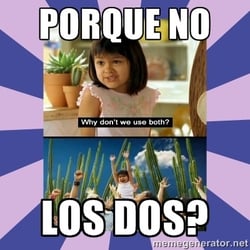 I love that Old El Paso ad, with the family arguing over whether to have hard or soft tacos, even bringing out a taco wheel to help with the decision. The little girl shrugs and asks: “¿Porque no los dos?" or "why not have both?"
I love that Old El Paso ad, with the family arguing over whether to have hard or soft tacos, even bringing out a taco wheel to help with the decision. The little girl shrugs and asks: “¿Porque no los dos?" or "why not have both?"
Having put an end to the taco feud, she is hoisted atop shoulders and celebrated as a hero in her village. “¿Porque no los dos?” is the perfect way to settle almost any argument on the internet. (Meme = advertising home run.)
It is useful when thinking about Kaizen as well. Asking if Kaizen events or daily Kaizen works better, is a bit like asking if a jackhammer works better than a drill. It’s a trick question. You simply can’t answer it without the context of what you are trying to accomplish. It really isn’t a question of which tool to use. It’s a question of when to use each method and for what.
Kaizen Events
Kaizen events are just what the name says - sporadic events. They are planned occurrences with a distinct beginning, middle, and end. During a Kaizen event, a small cross-functional team usually focuses 100% of their energy over a 2- to 5-day period to identify and execute improvements to a targeted issue or process. When does a Kaizen event make sense? Usually under the following circumstances:
- An immediate and relatively large breakthrough is needed to solve a particular problem
- The issue is significant enough to temporarily divert resources from other tasks
- The problem can reasonably be addressed in a short period of time
- You want to teach people how to improve using the PDSA (Plan, Do, Study, Act) cycle
- Intensive cross-functional collaboration is needed
Daily Kaizen
Daily Kaizen is just what the name says – daily and continuous. It is the practice of seeking opportunities for improvement across the entire organization every day. These improvements are usually small and incremental and often the result of repeated PDSA cycles. Daily Kaizen is about teaching each employee to be mindful of how and why processes are producing particular outcomes and how they might be more efficient, faster, higher quality and better for the customer. Daily Kaizen offers some distinct advantages including:
- Every employee can be involved in daily Kaizen
- Small, but troublesome problems can be addressed
- Daily Kaizen happens without disrupting other work
- There’s no need to wait for a designated time to act
- Unexpected opportunities for improvement can be identified
- The practice of Kaizen increases employee engagement
So, should you do Kaizen events or daily kaizen? The answer is easy. “¿Porque no los dos?” Let's do both!
Watch this free webinar to learn how to be a better Kaizen coach.
How to Be an Influential Kaizen Coach
 Why coaching matters to your organization, leaders, and staff
Why coaching matters to your organization, leaders, and staff- Practical methods for coaching staff and leaders
- How to develop people to be better improvement facilitators
- Numerous coaching scenarios and examples from Franciscan St. Francis Health and other organizations and other industries
- Key coaching fundamentals used at Franciscan



Add a Comment